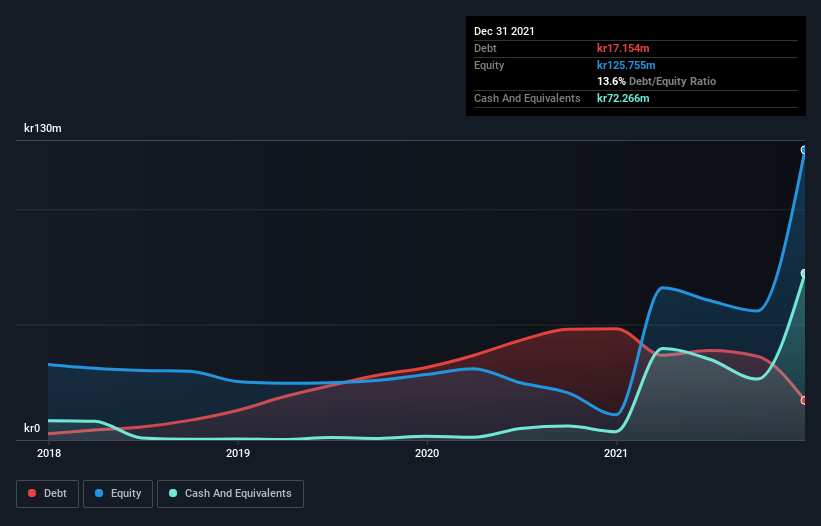
The external fund manager backed by Berkshire Hathaway's Charlie Munger, Li Lu, makes no bones about it when he says 'The biggest investment risk is not the volatility of prices, but whether you will suffer a permanent loss of capital.' When we think about how risky a company is, we always like to look at its use of debt, since debt overload can lead to ruin. As with many other companies Paxman AB (publ) (STO:PAX) makes use of debt. But is this debt a concern to shareholders?
What Risk Does Debt Bring?
Debt is a tool to help businesses grow, but if a business is incapable of paying off its lenders, then it exists at their mercy. Part and parcel of capitalism is the process of 'creative destruction' where failed businesses are mercilessly liquidated by their bankers. However, a more usual (but still expensive) situation is where a company must dilute shareholders at a cheap share price simply to get debt under control. Of course, plenty of companies use debt to fund growth, without any negative consequences. The first step when considering a company's debt levels is to consider its cash and debt together.
Check out our latest analysis for Paxman
What Is Paxman's Net Debt?
You can click the graphic below for the historical numbers, but it shows that Paxman had kr17.2m of debt in December 2021, down from kr48.2m, one year before. However, its balance sheet shows it holds kr72.3m in cash, so it actually has kr55.1m net cash.

How Healthy Is Paxman's Balance Sheet?
Zooming in on the latest balance sheet data, we can see that Paxman had liabilities of kr34.8m due within 12 months and liabilities of kr5.83m due beyond that. Offsetting these obligations, it had cash of kr72.3m as well as receivables valued at kr17.3m due within 12 months. So it can boast kr49.0m more liquid assets than total liabilities.
This surplus suggests that Paxman has a conservative balance sheet, and could probably eliminate its debt without much difficulty. Simply put, the fact that Paxman has more cash than debt is arguably a good indication that it can manage its debt safely. There's no doubt that we learn most about debt from the balance sheet. But it is Paxman's earnings that will influence how the balance sheet holds up in the future. So if you're keen to discover more about its earnings, it might be worth checking out this graph of its long term earnings trend.
In the last year Paxman wasn't profitable at an EBIT level, but managed to grow its revenue by 26%, to kr105m. With any luck the company will be able to grow its way to profitability.
So How Risky Is Paxman?
We have no doubt that loss making companies are, in general, riskier than profitable ones. And we do note that Paxman had an earnings before interest and tax (EBIT) loss, over the last year. Indeed, in that time it burnt through kr4.8m of cash and made a loss of kr13m. With only kr55.1m on the balance sheet, it would appear that its going to need to raise capital again soon. With very solid revenue growth in the last year, Paxman may be on a path to profitability. Pre-profit companies are often risky, but they can also offer great rewards. There's no doubt that we learn most about debt from the balance sheet. But ultimately, every company can contain risks that exist outside of the balance sheet. These risks can be hard to spot. Every company has them, and we've spotted 4 warning signs for Paxman (of which 1 can't be ignored!) you should know about.
If you're interested in investing in businesses that can grow profits without the burden of debt, then check out this free list of growing businesses that have net cash on the balance sheet.
If you're looking to trade Paxman, open an account with the lowest-cost platform trusted by professionals, Interactive Brokers.
With clients in over 200 countries and territories, and access to 160 markets, IBKR lets you trade stocks, options, futures, forex, bonds and funds from a single integrated account.
Enjoy no hidden fees, no account minimums, and FX conversion rates as low as 0.03%, far better than what most brokers offer.
Sponsored ContentNew: Manage All Your Stock Portfolios in One Place
We've created the ultimate portfolio companion for stock investors, and it's free.
• Connect an unlimited number of Portfolios and see your total in one currency
• Be alerted to new Warning Signs or Risks via email or mobile
• Track the Fair Value of your stocks
Have feedback on this article? Concerned about the content? Get in touch with us directly. Alternatively, email editorial-team (at) simplywallst.com.
This article by Simply Wall St is general in nature. We provide commentary based on historical data and analyst forecasts only using an unbiased methodology and our articles are not intended to be financial advice. It does not constitute a recommendation to buy or sell any stock, and does not take account of your objectives, or your financial situation. We aim to bring you long-term focused analysis driven by fundamental data. Note that our analysis may not factor in the latest price-sensitive company announcements or qualitative material. Simply Wall St has no position in any stocks mentioned.
About OM:PAX
Paxman
Develops and sells Paxman scalp cooling system to minimize hair loss in connection with chemotherapy treatment worldwide.
Exceptional growth potential with outstanding track record.
Similar Companies
Market Insights
Community Narratives


